|
|
|
Sort Order |
|
|
|
Items / Page
|
|
|
|
|
|
|
| Srl | Item |
| 1 |
ID:
159939
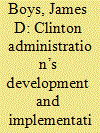

|
|
|
|
|
| Summary/Abstract |
The concept of an assault on the critical infrastructure of the United States is often referred to as a ‘Cyber Pearl Harbor’. This implies that such an attack would come as a surprise. By 2016, however, few could claim to be surprised by such an event. This paper explains how the Clinton administration addressed cybersecurity in the 1990s as computers became an everyday item. With the benefits of this era, however, came potentially devastating implications for national security as the Clinton administration was required to confront a form of politically motivated violence unlike any that had been seen before Cyberterrorism.
|
|
|
|
|
|
|
|
|
|
|
|
|
|
|
|
| 2 |
ID:
168392


|
|
|
|
|
| Summary/Abstract |
A firestorm of protest greeted revelations of the rendition program when it was made public during the George W. Bush administration. The operational and political basis for the rendition initiative, however, had been established years before George W. Bush became president and was viewed as 'a new art form' by the Clinton administration. Despite significant efforts to distinguish between the two administrations, the evolution of the rendition initiative during the 1990s reveals far greater continuity than has been widely acknowledged. This paper examines the manner in which the Clinton administration utilized rendition in its own war on terror, years before George W. Bush came to power, with little public scrutiny or outrage.
|
|
|
|
|
|
|
|
|
|
|
|
|
|
|
|
| 3 |
ID:
111244
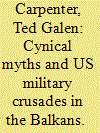

|
|
|
|
|
| Publication |
2011.
|
| Summary/Abstract |
Misleading propaganda and the creation of false history were pervasive and corrosive during the Balkan wars of the 1990s. Both the Clinton administration and the news media were responsible for the disreputable situation. And unlike the discrediting of the Bush administration's distorted accounts regarding the Iraq crisis, the Balkan myths are as prevalent today as when they were first created. That situation is dangerous on two counts. First, it inhibits the formulation of intelligent, realistic, and equitable policies regarding current Balkan issues. Second, the success of such a campaign of disinformation creates the irresistible temptation for officials and policy lobbies to try the same techniques during future international crises in that region or elsewhere.
|
|
|
|
|
|
|
|
|
|
|
|
|
|
|
|
| 4 |
ID:
167612


|
|
|
|
|
| Summary/Abstract |
Newly available sources show how the 1993–95 debate over the best means of expanding the North Atlantic Treaty Organization unfolded inside the Clinton administration. This evidence comes from documents recently declassified by the Clinton Presidential Library, the Defense Department, and the State Department because of appeals by the author. As President Bill Clinton repeatedly remarked, the two key questions about enlargement were when and how. The sources make apparent that, during a critical decisionmaking period twenty-five years ago, supporters of a relatively swift conferral of full membership to a narrow range of countries outmaneuvered proponents of a slower, phased conferral of limited membership to a wide range of states. Pleas from Central and Eastern European leaders, missteps by Russian President Boris Yeltsin, and victory by the pro-expansion Republican Party in the 1994 U.S. congressional election all helped advocates of full-membership enlargement to win. The documents also reveal the surprising impact of Ukrainian politics on this debate and the complex roles played by both Strobe Talbott, a U.S. ambassador and later deputy secretary of state, and Andrei Kozyrev, the Russian foreign minister. Finally, the sources suggest ways in which the debate's outcome remains significant for transatlantic and U.S.-Russian relations today.
|
|
|
|
|
|
|
|
|
|
|
|
|
|
|
|
| 5 |
ID:
100416
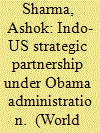

|
|
|
| 6 |
ID:
114720
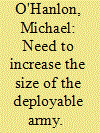

|
|
|
| 7 |
ID:
155040
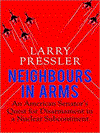

|
|
|
|
|
| Publication |
Gurgaon, Penguin Random House India Pvt Ltd, 2017.
|
| Description |
xxiv, 262p.hbk
|
| Standard Number |
9780670089314
|
|
|
|
|
|
|
|
|
|
|
|
Copies: C:1/I:0,R:0,Q:0
Circulation
| Accession# | Call# | Current Location | Status | Policy | Location |
| 059195 | 327.1747/PRE 059195 | Main | On Shelf | General | |
|
|
|
|
| 8 |
ID:
122300


|
|
|
|
|
| Publication |
2013.
|
| Summary/Abstract |
This article examines the nuclear nonproliferation policy of the Clinton administration (1993-2001) toward India. It is argued that initially President Clinton was focused on a "capping, rollback, and eliminate" approach toward Indian nuclearization. But, after India conducted nuclear tests in 1998, there was a discernible change in Clinton's policy toward India, which has largely gone unrecognized. The Clinton administration considerably shifted the nuclear goalposts-from the cap, rollback, and eliminate Indian nuclear weapons-to merely the exercise of nuclear restraint by India. This, in turn, implied a tacit acceptance of the nuclear weapons possessed by India. The Clinton administration cleared the languishing nuclear debris and created space for the next administration to reset the anomalous nuclear relationship with India.
|
|
|
|
|
|
|
|
|
|
|
|
|
|
|
|
| 9 |
ID:
086321
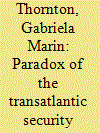

|
|
|
|
|
| Publication |
2008.
|
| Summary/Abstract |
The transatlantic security project - with its central focus on the North Atlantic Treaty Alliance (NATO) - was by many accounts a phenomenon that occurred because of the bipolarity of the international system during the Cold War. The main contention of this article is that the foundation of the transatlantic security project was built on a paradox. The transatlantic security project may have been the right response to the security challenges of the Cold War, but the project, as conceived originally, was not able to meet the new challenges brought by the fall of the Soviet Union. With the Cold War gone, the nature of the power relations between the main pillars of the transatlantic relationship, the US and the EU, started to change. Therefore, what best defines the idiosyncratic existence of the transatlantic space de notre jours? In order to answer this question, this article is structured as follows. First, I analyse the paradox of the transatlantic security project. I then explore the relationship between the newly created EU institutions and NATO. Third, I claim that the Clinton administration tried to solve the transatlantic paradox by taming European power, that is, by making efforts to tie the EU's security institutions into NATO. By contrast, the Bush II presidency has tried to divide European power. I conclude by arguing that references to the transatlantic relationship, as to a monolithic bloc - a way in which it was conceived and referred to during the Cold War - no longer reflect the new transatlantic reality. A new transatlantic security space has been emerging; a more fragmented space - a space invested with a new dynamic, in which actors' security and geo-political concerns have started to diverge.
|
|
|
|
|
|
|
|
|
|
|
|
|
|
|
|
| 10 |
ID:
153552
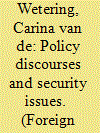

|
|
|
|
|
| Summary/Abstract |
This article explores how changing US security policies toward India were enabled by policy discourses. Since the second Clinton administration, the United States has shown a continuous interest in India. In order to analyze this, the article makes use of a critical constructivist approach in which phenomena are seen as socially constructed. It reveals how meanings are produced and attached to objects such as the United States and India within policy discourses. In policy discourses, security policies are not merely solutions to security issues: Policy discourses help to construct how security problems, objects, and subjects should be understood, and they simultaneously articulate security policies to solve the issues. These policy discourses enable and constrain foreign policy options available to foreign policy-makers. This article demonstrates that in 1997, India’s subject-position transformed, which made possible future policy changes in US foreign policy toward India.
|
|
|
|
|
|
|
|
|
|
|
|
|
|
|
|
| 11 |
ID:
142797


|
|
|
|
|
| Summary/Abstract |
The former Clinton administration official unveils progress that North Korea has made on four parallel nuclear and missile initiatives that could soon amount to a survivable, strategic nuclear capability. As a result, it is time for the United States to state unambiguously that it will impose secondary sanctions and resort to pre-emptive military action if Pyongyang performs additional nuclear or missile tests or deploys certain new and threatening military systems.
|
|
|
|
|
|
|
|
|
|
|
|
|
|
|
|
| 12 |
ID:
078486


|
|
|
|
|
| Publication |
2007.
|
| Summary/Abstract |
The purpose of this article is to afford a full explanation as to why the 'Somalia incident' had such a massive impact on US politics and subsequent foreign policy decisions. Why did the raid elicit such a storm of criticism when similar operations such as Beirut (1983), Grenada (1983), Panama (1989), and the Gulf War (1991) did not? Was it because of a negative US public? Was it shock on the part of the Executive or Legislative Branches? Was it because of extreme pressure from one of America's most conservative power bases, the military? Or could it be, that sensing a potential threat to domestic concerns, a Clinton Administration, whose commitment to multilateralism was more diaphanous than dynamic, simply abandoned its policy to the spears, of its critics
|
|
|
|
|
|
|
|
|
|
|
|
|
|
|
|
| 13 |
ID:
170927


|
|
|
|
|
| Summary/Abstract |
In 1993, the Clinton Administration announced that containing the ‘hostile’ and ‘dangerous’ government of Iran would be a key tenet of its Middle East policy. To some scholars, the Administration’s decision reflected the influence of Israel and its supporters in Washington over American foreign policy. However, this conventional wisdom is misguided. Bill Clinton inherited and endorsed the Iran policy of his predecessor, George H.W. Bush, who concluded that Iran’s support for terrorism and pursuit of nuclear technology warranted a strong response. Bush decided on this approach when Israel was distracted and unconcerned about Iran. In fact, Israeli leaders only began drawing attention to the risks posed by Iran after America changed its policy.
|
|
|
|
|
|
|
|
|
|
|
|
|
|
|
|
|
|
|
|
|